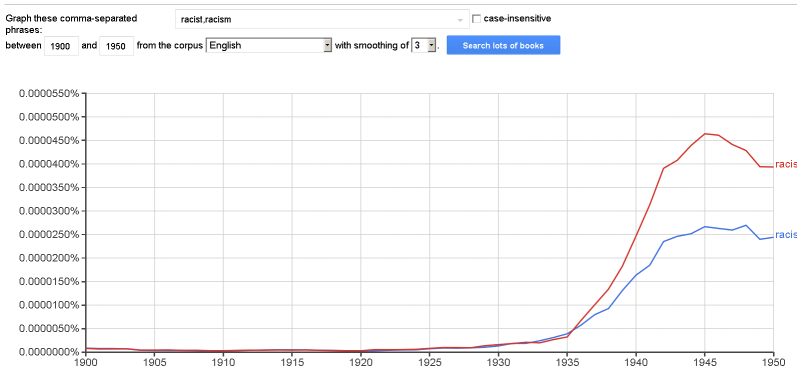The meme as displayed is anachronistic, ahistorical and a complete confabulation of terms and meanings. It makes really no direct sense whatsoever.
But as a symptom to be used as a diagnostic marker it has value.
Trotsky didn't invent the word, didn't change much of its meaning or applicability, nor its popularity nor gig he push it into now common usage or alleged political implication.
The usual red flag is of course lack of attribution when quoting.
But it gets much better.
Origin of the word
"Raciste" as a collection of letters called "a word" is a French creation (raciste / racisme) of the 19th century, as its relative 'racism' entered Russian and English at the start of the 20th century and was in wider use as the Oxford Etymological Dictionary traces.
The terms racist and racism have a long and storied history that predate Trotsky himself. ‘Raciste’ and ‘racisme’ crop up regularly in the works of late-19th and early-20th century French agitators, while their English language counterparts first appeared in the Oxford English Dictionary in 1902.
Of course, at the time, these words were predominately used to refer to (a) the pseudo-scientific classification of human beings into distinct races, (b) the supposed hierarchies that result from those distinctions, and (c) the scientific and/or moral righteousness of white racial superiority.
Granted, it wasn’t really until the late 1920s and 1930s—when these ideas and systems found their way from the colonies into the discourse and structures of European and American domestic polities—that the terms took on a negative or pejorative bent.
But that’s hardly surprising, is it?
Trotsky first used the word racist, or something to that effect, in a treatise entitled ‘What is National Socialism?’. Now, the last time I checked, the Nazis were quite racist, and for the love of Gott, I can’t think of any way to spin that in a positive light.
James A. Chisem: "Did Leon Trotsky Invent Racism?" Ordinary Times, Jan 24, 2017
One problem in the analysis above is that it reads the early, up-to-Trostky and later use of the word racist/racism with modern minds. But that's not what the word originally meant!
This can be seen how the word was and sometimes is translated into German. The Nazis were racists in our worldview and in theirs as well. For us, it should be now considered describing something negative, for them something positive. But did they use this positively connoted word themselves? No, not exactly. They did not utter that 'perfidious French' word, but used the German word völkisch in the sense that the French used raciste and Trotzky used slavophiles and расистов.
Changing the meanings
Over the course of the 20th century the meaning.
At the time of is first usage, a member of the Klan would probably not have been called a racialist. It’s earliest showing seems to come from a 1901 edition of Harper’s Weekly. Curiously, it meant simply one who belonged to a particular race. There was no real negative or positive connotation involved.
It must also be remembered, of course, that “race” at the time was often used interchangeably with nationality, especially when it came to language.
So if Trotsky didn’t even use the term racist (let alone invent it) in 1930, when did it come about? The OED holds that the first printed usage came from the Portland Oregonian in their December 14, 1924 edition: “The elections show the Germans at the moment want neither racists nor communists – that is, neither extreme nationalists nor extreme revolutionists.” 13 This citation is nice as it provides a definition for the term – extreme nationalists. In Germany, of course, this meant non-Jews, though the term racist was more of a descriptor than an epithet.
Of Racist, Racistov And Leon Trotsky – The Fortnightlyish Word. This Cruel War, Nov 2016
Reading again the originating meme and its supposed consequences or current societal diagnosis makes for a fun reading now:
The term 'racism' is much more recent than the factual situation it refers to. The French adjective "raciste" first appeared in the 1890s as a self-designation of nationalists. The noun "racism" did not emerge until the 1920s as an anti-racist combat term. However, there is no undisputed definition of what is meant by it in the numerous social, cultural and historical disciplines that deal with the phenomenon. Basically, a distinction can be made between attempts to define racism in terms of its content, its biologistic substance, and in terms of its formal nature, its social-psychological function.
Christian Koller: "Was ist eigentlich Rassismus?", Bundeszentrale für politische Bildung, 8.12.2015
Or on a more fundamental level that explains the rise in usage of the word, now in its changed meaning:
The first problem that any history of anti-racism must confront is a basic one. The term ‘anti-racism’ is a twentieth- century creation. Indeed, it did not appear in regular usage until the 1960s (and even then it was largely confined to English- and French-speaking countries). Its development during this decade accompanied a number of other new forms of emancipatory discourse, such as anti-sexism and gay rights. The apparent novelty of anti-racism partly explains why it has rarely been situated within a broader historical and sociological context. However, although the term is new, much of its symbolic power relies on its ability to draw on ideas, such as human equality and cultural relativism, of considerable age. The linguistic history of the term should, perhaps, also be extended back, as far as the 1930s, the period when The Oxford English Dictionary (1989) cites the first usage of both ‘racism’ (1932) and ‘racist’ (1936) (the use of ‘racialism’ is found earlier, in 1902). All these categories were first employed as terms of criticism. As this suggests, the concept of racism was conceived by those who opposed it, by anti-racists. Strictly speaking, any attempt to portray anti-racism before this time, before the concept of racism existed, is anachronistic.
Alastair Bonnett: "Anti-Racism", Key Ideas, Routledge: London, New York, 2000. (p 10)
The meme thus has to be subtly copy edited to reflect reality.
"Racist. An established word at the time of Trotsky's writings. Used by him to describe people antagonistic to international solidarity, one core concept of communism. Now with a changed meaning. Used today in memes that mix up so many details around this that all they say is users of that meme probably are racists that don't like being correctly called racists."
Taguieff examines the two different senses that the word racism (racisme) carried: first in the 1890s, when it was used as a self-designator (for those speaking of the supreme qualities of the French "race"); then in the 1930s, when it was used as an other-designator for the German who was "racist" through self-designation (in German, völkisch).
Note by translator Hassan Melehy to Pierre-Andre Taguieff: "The Force of Prejudice On Racism and Its Doubles", Contradictions, Volume 13, University of Minnesota Press: Minnesota, London, 2001. (La Force du préjugé – essai sur le racisme et ses doubles , 1987). (p x)


